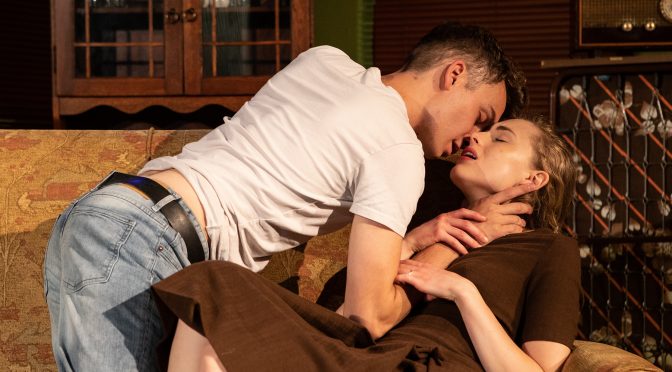Graham Watts’ quality production of this neglected play by Sophie Treadwell is a tough one to write about. That this world premiere is 65 years late indicates the unjust difficulties its author faced. It’s important to see more work by this great woman writer. And to see the topics of homosexuality, sexual violence and prostitution dealt with in such an early work is fascinating. But while it’s an admirable labour of love for Watts as director and producer, the play has missed its moment.
The titular lead, played with gusto by Thomas Martin, is so tormented by his homosexuality that he kills a man who picks him up in a hotel room. In a nice twist, the focus is really his sham marriage with the naïve Wilma who, having failed in her quest to ‘save’ Garry, still wants to stand by him. It’s Wilma’s play and the part makes a true starring role for Phebe Alys, who is terrific throughout. But while the piece doesn’t lack dramatic potential, the psychology offered is basic and setting out its scenario is so laboured that the play shows its age.
So, while the subject matter is bold, the show lacks tension. There’s no flaw on the part of Watts and the cast. It’s just that everything is spelled out too clearly and is predictable anyway. Garry’s status as a “punk” feels quaint – it’s only when he starts explaining his “flashes of hate” that he becomes scary. Wilma is too much the innocent abroad, although Alys is superb at reflecting how her husband being “afraid inside” becomes contagious. But both characters contain so little self-awareness that they fail to convince. The supporting characters (again, nicely played by Claire Bowman and Matthew Wellard) inject some questioning cynicism but only act as foils and are similarly flat and repetitive.
Treadwell’s skills are clear and considerable: the play’s structure is precise and there’s an impressive amount of action squeezed into one room. But, in pushing its 1950s audience, too much has to be explained and we end up with no surprises. As much as some bigots might like it, we no longer need to spell out the very idea of homosexuals existing. What’s going on with Garry is all too obvious at every step and much of the play’s shocks and twists are clear too early. The piece might be important and interesting history, but it isn’t one for today.
Until 22 June 2019
Photo by Ali Wright

